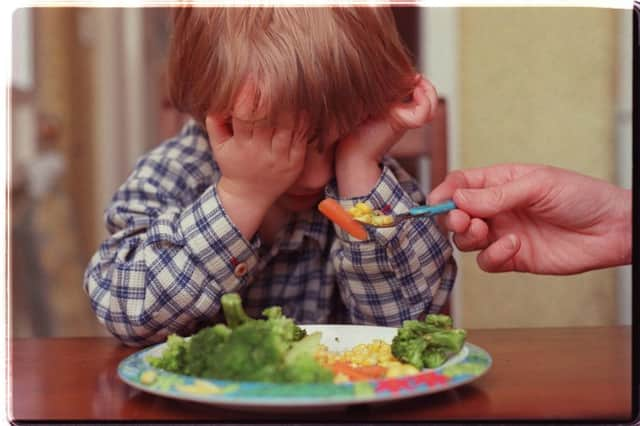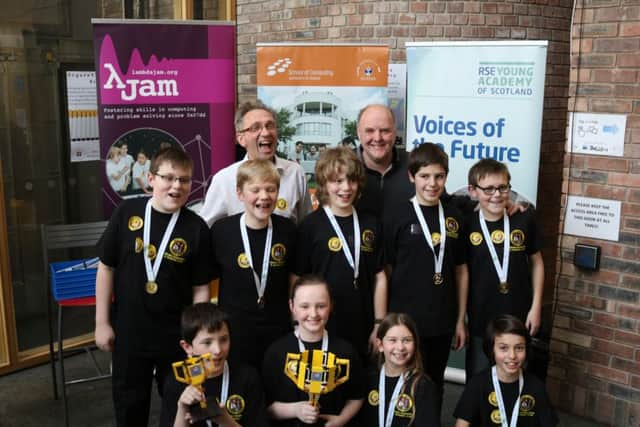Children '˜twice as likely to eat greens' if rewarded


The pupils, at West Linton primary school in Peeblesshire, were 50 per cent more likely to eat vegetables at lunchtime if they were offered an incentive.
If they ate their greens, the children were rewarded with tokens which could then be exchanged for prizes including extra playtime, a class teddy and new sports equipment.
Advertisement
Hide AdAdvertisement
Hide AdThe project, the brainchild of a group of pupils at the school, led to a 47 per cent reduction in vegetable waste at lunchtimes.


The scheme could now be extended to other schools across the region in an attempt to discourage waste and promote healthy eating.
A team of ten pupils, aged between 11 and 12, created the incentive scheme as part of an entry in a competition which encouraged schools to devise solutions to deal with waste.
The pupils - who call themselves the West Linton Wasps - also earned a spot in this year’s FIRST LEGO League (FLL) World Festival in St Louis, Missouri, USA, by creating their own Lego robot.
The team built, tested and programmed their own waste-busting robot using LEGO MINDSTORMS.


They will take the robot to the US where it will go head to head with 108 schools from across the world in a series of waste-related robotic tasks.
FLL in Scotland is organised by Lambda Jam and the RSE Young Academy Scotland with the support of Skills Development Scotland (SDS).
Oscar Weipers, one of the West Linton Wasp team members, said the team came up with the idea to help pupils at their school to become “fitter and healthier”
Advertisement
Hide AdAdvertisement
Hide AdBefore the project, 60 per cent of the served vegetables at West Linton ended up in the bin. The team managed to reduce waste to just 13 per cent.
He said: “Vegetables are healthy and nutritious which means the more veg we throw away, the more‘goodness’ we throw away which could be helping children become fitter and healthier.
“Many people think that pupil telling a pupil is better than an adult telling a pupil. Even the Head of Food and Nutrition said this. So our incentive scheme uses peers instead of adults to help pupils properly listen to the project and how it works and why to eat lots of vegetables. This is something that we have never heard of in an incentive scheme.
“We think the most innovative and original part of our project is bringing excitement and competition to something that used to be boring and dull. We have taken school dinners to a new level by making it exciting for pupils to eat veg. Lately, pupils have been asking to swap to a different dinner, just to have vegetables - that is a big change.”
John Levine, the West Linton Wasps team coach, said: “The children showed real dedication, and worked seven hour days over the Christmas holidays. The team have really shown their talents in solving problems, designing solutions and programming, and I’m sure many of them will be inspired by this to go on and do great things in engineering and science.”
Laura Meikle of Lambda Jam said: “This competition has been an incredible opportunity for the kids at West Linton Primary School. The level of innovation, teamwork and effort they have shown is truly outstanding.
“Two UK schools have previously gone on to win the international final. It would be amazing if the West Linton Wasps could make it a hat trick for schools in the UK and a first for Scotland.”
SDS is supporting the programme as part of its Digital World campaign, which aims to change attitudes and promote careers in the digital technology sector.
Advertisement
Hide AdAdvertisement
Hide AdA bursary scheme was set up to provide robot kits, training and support.
Priority was given to teams likely to have limited access to resources and to teams with a majority of female participants, in an effort to encourage more girls to get involved and in turn consider careers in engineering and technology.
Laura Meikle said: “The IT industry needs to broaden its talent pool and we see this as one effective way of getting girls interested in tech. Over a third of students taking part in this year’s FLL were girls, a marked increase from previous years, and the bursary scheme has had an incredibly positive impact.”
Claire Gillespie, key sector manager for ICT and digital technology skills at SDS, said: “The FLL is a great way to get pupils engaged in careers like engineering from an early age. It shows just how fun, exciting and rewarding a career like this can be and it’s fantastic to see such young children coming up with inventive and creative ways to solve real-world problems.”
